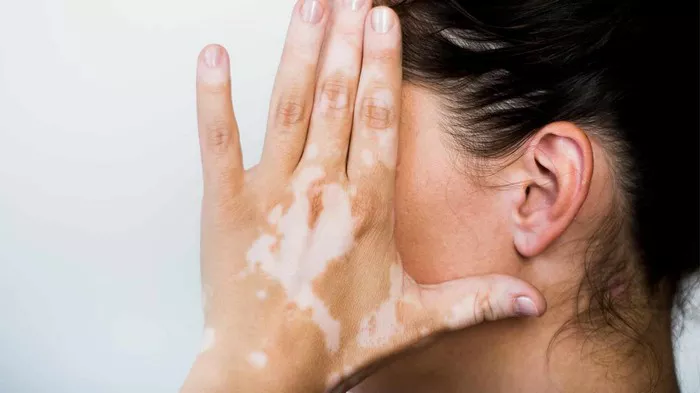Vitiligo is a skin condition characterized by the loss of pigment, resulting in white patches on the skin. While it doesn’t pose a direct threat to physical health, it can significantly impact one’s self-esteem and quality of life. Ayurveda, the ancient Indian system of medicine, offers a holistic approach to managing vitiligo, focusing on restoring balance to the body and treating the root cause of the condition. In this article, we explore the best ayurvedic medicine for vitiligo, backed by evidence-based research and centuries of traditional wisdom.
Understanding Vitiligo: A Brief Overview
Before delving into ayurvedic treatments, it’s essential to understand the underlying causes and symptoms of vitiligo. While the exact cause remains elusive, it is believed to involve a combination of genetic, autoimmune, and environmental factors. Vitiligo manifests as depigmented patches on the skin, most commonly appearing on areas exposed to the sun, such as the face, hands, arms, and feet. Apart from the physical symptoms, vitiligo can also lead to emotional distress, especially in societies where fair skin is highly valued.
Ayurvedic Approach to Vitiligo
Ayurveda views vitiligo as a manifestation of imbalances in the body’s doshas, primarily Pitta and Kapha. According to ayurvedic principles, vitiligo occurs due to the aggravation of Pitta dosha, leading to the destruction of melanocytes, the cells responsible for producing melanin. Therefore, the primary goal of ayurvedic treatment for vitiligo is to pacify Pitta dosha, restore balance to the body, and stimulate melanin production.
Best Ayurvedic Medicine for Vitiligo
1. Bakuchi (Psoralea corylifolia): Bakuchi, also known as Babchi, is one of the most renowned herbs in Ayurveda for treating vitiligo. It contains psoralens, compounds that stimulate melanin production and promote pigmentation in the skin. Bakuchi oil, when applied topically to depigmented patches, has shown promising results in repigmenting the skin. Additionally, oral supplementation with Bakuchi powder or capsules can help address vitiligo from within.
2. Guduchi (Tinospora cordifolia): Guduchi, also called Giloy, is a potent immunomodulatory herb that helps balance the body’s immune response. In vitiligo, where autoimmune factors play a role, Guduchi can help regulate the immune system and prevent further destruction of melanocytes. Regular consumption of Guduchi powder or Guduchi capsules can support the body’s natural defenses and improve skin health.
3. Manjistha (Rubia cordifolia): Manjistha is a blood-purifying herb that aids in detoxification and elimination of toxins from the body. In vitiligo, detoxification is crucial for removing accumulated ama (toxins) that may be contributing to the condition. Manjistha promotes healthy blood circulation and lymphatic drainage, supporting the body’s natural healing process. It can be taken internally as a powder or decoction and applied topically as a paste for enhanced benefits.
4. Neem (Azadirachta indica): Neem is renowned for its antibacterial, antifungal, and anti-inflammatory properties. In vitiligo, Neem helps alleviate itching, inflammation, and secondary infections that may occur in depigmented areas. Regular application of Neem oil or Neem paste can soothe the skin and prevent complications associated with vitiligo. Consuming Neem capsules or Neem tea also supports overall skin health.
5. Triphala (Three Fruits): Triphala is a traditional Ayurvedic formulation consisting of three fruits: Amla (Emblica officinalis), Haritaki (Terminalia chebula), and Bibhitaki (Terminalia bellirica). Triphala acts as a natural antioxidant, promoting detoxification and rejuvenation. It helps improve digestion, absorption, and assimilation of nutrients, which are vital for maintaining healthy skin. Triphala powder or Triphala capsules can be taken internally to support skin health and enhance the effectiveness of other Ayurvedic remedies for vitiligo.
Conclusion
Ayurveda offers a holistic approach to managing vitiligo, addressing the underlying imbalances in the body and promoting skin health from within. The best ayurvedic medicine for vitiligo focuses on pacifying Pitta dosha, detoxifying the body, and stimulating melanin production. Herbs like Bakuchi, Guduchi, Manjistha, Neem, and formulations like Triphala play a crucial role in restoring balance to the body and repigmenting the skin. However, it’s essential to consult with a qualified Ayurvedic practitioner before starting any herbal treatment regimen to ensure safety and efficacy. With patience, consistency, and proper guidance, Ayurveda offers hope for those seeking natural solutions for vitiligo management.
























